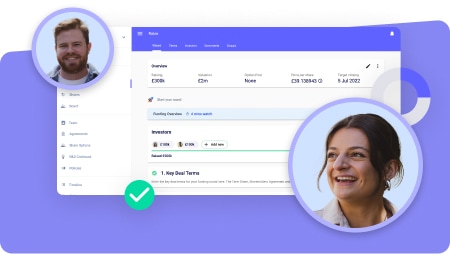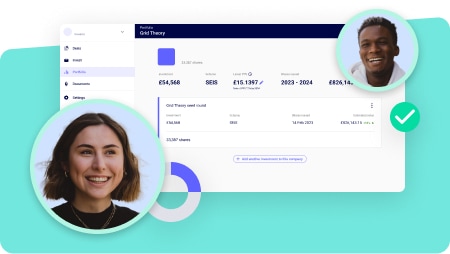Read transcript
Anthony Rose: So hello, today in our amazing founder interview series, I’m talking with Elie from ScultureAI. So Elie, tell us about yourself and about the company.
Elie Rashbass: Thanks so much, Anthony. So my name’s Elie Rashbass. I’m CEO and co-founder of ScultureAI. Before I was doing this, I was working in investment banking and different investment roles for the last close to a decade. And I’m really excited now to be working with an amazing group of about 10 people to bring ScultureAI to life.
Anthony Rose: So was a banker, woke up one day and went, I need to do a startup. Enough of this well-paid banking job, I should just have the life of a founder. Okay, so tell me what’s the problem that ScultureAI solves?
Elie Rashbass: Organisational culture is a massive driver of financial performance of employee wellbeing. And just generally an opportunity to either create or destroy tremendous value for organisations. And companies have become increasingly good at determining what their culture should be, what values are important to them.
But beyond putting posters in the elevator and telling employees, ‘this is what we are’, there are very few tools available to a company to embed that culture at scale across an organization. And it doesn’t matter how big the font is on the posters. It doesn’t matter how bright the colours are. It doesn’t make people more innovative, more determined, more curious. And we know that employees that relate to the culture, that connect with the culture are nearly four times more engaged, are much less likely to burn out. So this is a real problem facing companies that they just can’t necessarily embed the culture that they know they want.
Anthony Rose: So that sounds amazing. You know at SeedLegals, we’re 160 people and we’ve gone through the, you know, 30 people, 50 people, 100, 150 people and know that, you know, when you’re three people, culture, whatever, when you’re a hundred plus, it’s super important. How do you create that? And we also know that having the cool coasters and the mission statements and so on is nice, but there has to be more. So how do you actually solve this problem?
Elie Rashbass: So we believe that that missing link is coaching and we’ve created an AI-powered coach that works alongside everybody, each person individually, and coaches them in their everyday interactions. So emails, instant messages, teams, Slack messages, and coaches them specifically on behaviour, not language, not style, but on behaviour and activities that are linked to the company’s values. And of course, we’ve trained each one to be specific to that company, to be able to tune into the particulars of that context which it’s being coached on.
And we’ve designed it from the ground up to completely protect the privacy of both the individual and the company as well.
Anthony Rose: So would I, for example, at SeedLegals connected to my Slack and then would monitor, when I say monitor in a good way, everyone’s conversations and somehow we would have trained it or told it what our tone of voice should be and values and anti-bullying and so on. And then would gently remind people when they were getting into the zone, would it, you know. I mean, it sounds fantastic, right? Because, if you’re on Twitter, you see people tweet nonsense. And if only something had been there to tell them, maybe this sounds like it’s exactly the solution.
Elie Rashbass: Yes, we believe it is. It’s about being there in the moment and coaching and helping someone to reflect in ways that they perhaps hadn’t thought about beforehand. And you’re completely right that it is, it is things like tone, but it’s even more than that, it’s about behaviour. It’s about things like innovation and determination and curiosity. And it’s picking those out, which are some of the challenges that we’ve had as we’ve worked with the AI. And that’s really the amazing advancement that we think we’ve made to this space. So it’s about coaching people on behaviours in every interaction, not about feeding back to the company what people are doing. Of course, we’ll provide anonymised aggregated feedback back to the leadership of a company to help them inform their decisions and know where their culture is. But it will be completely private to the individual and we won’t be reporting back who’s innovative and who’s not.
Anthony Rose: That sounds super interesting. So what got you out of bed one morning to go, I want to do exactly this.
Elie Rashbass: So as I mentioned, I’d been working in investment banking, financial services for the best part of a decade. And I think every banker could recognize the importance of having a tool like this. And I think on top of that, my father, who’s the founder and chairman of the company, he’s been a serial CEO. He’s been someone who’s been thinking about culture for a long time.
He’s very involved in AI research as well. And this was his idea, kind of bringing together his ideas and thought leadership in these different domains. And I, together with the other co-founders, were incredibly excited to bring together a quite unique combination of skills to tackle a real problem for society, to play a part in fixing the productivity conundrum that companies find themselves in, to help employee engagement, to help with mental health, and to change really what it means to work for hopefully many people.
Anthony Rose: So can you give me an example of how it would be used within a company?
Elie Rashbass: Yeah, of course. So imagine, for example, a situation where you ask one of your colleagues for an update on a certain project. And they come back to you and say, ‘Hey, Anthony, I’m sorry, I can’t give an update on this for a couple of days because Sarah is away.’
So quite a common type of situation, which I’m sure we’ve all experienced. We’ve probably all written emails like that before as well, or Slack messages. But if you think about a company that values something like determination, something like proactivity, something like excellence and kind of striving for the absolute best performance, what our coach would be encouraging, and we’ve seen emails like this, is, there something you could do in the interim while Sarah is away? Are there others that you can involve in the team to potentially advance this, at least in a preliminary way?
So of course the coach recognises Sarah’s not there, you can’t do everything, but if a company values determination, is there something you could do in the meantime? So again, very behavioural, getting people to reflect, we’re not telling them what to do, we’re not telling them what they should do, but giving them things to think about.
Anthony Rose: That’s super interesting because it’s often the difference between the highest performers and general people in the company, which is the highest performers will, you know, there’s a rock in the stream and the water will flow around it and find its way past it. They will find a way to do it without even telling you, Sarah’s away, while others will hang on to you to improve the company’s performance from there.
Elie Rashbass: Yes, exactly. And it’s helping people realise how they’re being perceived. People may not realise when they send that email to you that actually you’re thinking maybe, or was there nothing they could do in the meantime? It’s helping people to be their best. And that’s why we think people are going to love using this tool because you won’t know when you receive that email that we’d coach them to do that. You’ll just see them coming across as their very best with maximum impact. And of course, creating more value for the company as well.
Anthony Rose: And I think it’s really good that if the person receives an AI-created message saying, have you considered what to do while Sarah’s away? But if the CEO writes, have you considered sorting this without Sarah waiting on Sarah? It’s going to be like a passive-aggressive or just aggressive move, right?
So you can get the same message, but coming from the AI that will not be the person to be embarrassed that they are being pulled up for not doing a great job.
Elie Rashbass: Exactly. And of course, over time, it will be able to feedback to leadership such as yourself that perhaps determination is a particular strong point or particular bottleneck for the company. And that will help you focus on how you train your employees as well, it’s enhanced the coaching that we’re giving on the site.
Anthony Rose: Or in fact, to never ever let Sarah go on holiday ever again.
Elie Rashbass: Of course, that will be on you, not us.
Anthony Rose: All right, so now what are you finding in your research or your data is the delta between the way companies think they operate or aspire to operate and the way they actually operate?
Elie Rashbass: So we were fortunate to have a lot of data waiting for us in the space. This problem is not a new problem. So we were fortunate to have a lot of data support.
There’s been some really interesting research, particularly out of MIT from Professor Sal, where he looks at the correlation between what companies say their values are and what they actually are based on reviews on Glassdoor and what employees are actually saying. And in fact, there’s zero correlation usually, and sometimes it’s even negative because of course telling people to be innovative doesn’t make them innovative. So the research is very interesting in supporting this idea that just stating what a value is without actually helping to reinforce and train people doesn’t really work. So we’re there to try and help people and companies to overcome that problem.
Anthony Rose: So that’s really interesting. You know, previously I used to head up BBC iPlayer and after I left I built a startup and I got invited to talk at large media companies about innovation. And I realised that these companies talk about innovation.
And the more they talk about innovation, the less actual innovation they’re doing. And I’d present to the company how at a startup, you just let the team do things you ask for, you know, you don’t bother asking for permission, you ask for apology, you know, afterwards if it goes wrong. You just take the brakes off and let people do things instead of having innovation committees and so on. And afterwards, people would come up and say, Anthony, we loved and agree with everything you spoke about and our company will never ever do any of those because there are of the mindset that like innovation is a thing that is created rather than innovation is to just let everyone do stuff and let them go ahead and do it. So that’s fascinating. So now tell me why should an investor invest in ScultureAI?
Elie Rashbass: So I would say there are five main reasons why investors should invest. The first is this is a real critical issue facing CEOs with a third of CEOs saying that culture is the main driver of financial performance. This is a real issue on CEO’s minds.
Secondly, we think this is a very attractive business model. This is a technology business. We’re building one product, selling to many with recurring revenues.
And on the back of that, the third point is we hope to be able to offer investors very significant returns.
Fourthly, you’d be backing a team of experienced, incredible founders with a demonstrable record of adding value to companies.
And finally, and I think perhaps most importantly, is the opportunity to have a positive impact on society.
If we just think of one aspect of culture, which is the mental health aspect, according to the World Health Organization, nearly 12 billion days are lost a year to working days to depression, to anxiety, which is something probably everyone’s experienced in their own kind of network in the office. And I think this is an opportunity to play a part in fixing that and creating value for individuals, employees and society as a whole.
Anthony Rose: All right. That’s fascinating. And at SeedLegals I see lots of startups, you see all startups, and there are quite a few looking to solve mental health issues and so on. And there are various things. You might rate things every day. You ask questions. And I think this is really interesting that you tap into people’s conversations. And without people needing to do anything extra, you are sourcing that information directly and getting the source of truth rather than asking people questions which they eventually get bored of. So it sounds super interesting. Thank you so much.
Elie Rashbass: No, thank you.
Company culture plays a huge role in driving performance and wellbeing, but many organisations struggle to embed their values effectively. Posters and mission statements rarely translate into meaningful behavioural change, leaving employees disconnected and engagement low. That’s where ScultureAI comes in.
Co-founded by Elie Rashbass, the company has developed an AI-powered coaching platform that provides real-time, behaviour-focused feedback during everyday interactions like emails and Slack messages.
In this interview, SeedLegals Co-Founder and CEO, Anthony Rose, talks to Elie about how ScultureAI in-the-moment support is transforming workplace culture and what it means for the future of work.
Key takeaways
The problem with company culture
- Company culture is crucial for financial performance and employee wellbeing, yet many workplaces struggle to embed their values effectively across teams.
- Traditional approaches, like posters or mission statements, fail to influence behaviours, creating a disconnect between stated values and real practices.
ScultureAI’s solution
- ScultureAI uses an AI-powered coach to provide real-time, behaviour-focused feedback during everyday interactions like emails or Slack messages.
- The platform respects privacy and aligns coaching with company-specific values, such as innovation, determination, and curiosity.
The impact of culture coaching
- The AI coach encourages employees to reflect on their actions, helping them adopt behaviours that align with company values.
- Aggregated, anonymised insights help leadership understand cultural trends and make better decisions about team training and support.
- Improved alignment with cultural values boosts engagement, reduces burnout, and enhances collaboration within teams.



















